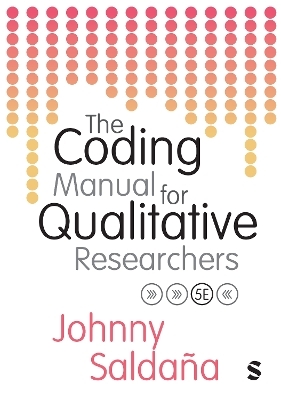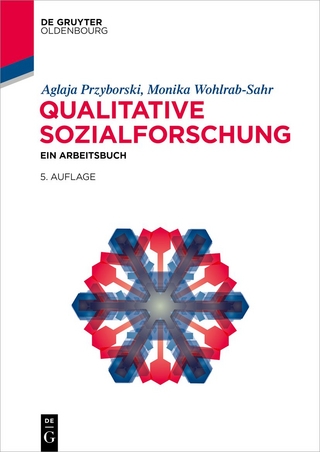
The Coding Manual for Qualitative Researchers
SAGE Publications Ltd (Verlag)
978-1-5296-8000-3 (ISBN)
- Noch nicht erschienen (ca. April 2025)
- Versandkostenfrei
- Auch auf Rechnung
- Artikel merken
Unlock the full potential of your qualitative research projects with this invaluable manual from world-renowned authority Johnny Saldaña. This essential guide delves into the latest advancements in coding, including the integration of AI tools like ChatGPT-4, empowering researchers to enhance their data analysis processes and outcomes.
This clearly updated edition offers:
· Comprehensive Coverage: Explore over 35 coding methods, complete with datasets, software screenshots, and multidisciplinary academic references.
· Global Appeal: Designed for an international readership, with inclusive data and real-world examples.
· Practical Guidance: Clear, academically grounded advice that bridges the gap between data generation and analysis, ensuring credibility and trustworthiness.
· Modern Relevance: Facilitates both manual and online coding, with detailed insights into CAQDAS and digital data handling.
Ideal for students, researchers, and professionals in education, the social sciences, and beyond, this manual with its’ accompanying online resources is your go-to reference for mastering qualitative coding and data analysis in the AI era.
Johnny Saldaña is Professor Emeritus from Arizona State University’s (ASU) School of Film, Dance, and Theatre in the Herberger Institute for Design and the Arts, where he taught from 1981 to 2014. He received his BFA in Drama and English Education in 1976, and MFA in Drama Education in 1979 from the University of Texas at Austin. Saldaña is the author of Longitudinal Qualitative Research: Analyzing Change through Time (AltaMira Press, 2003); Fundamentals of Qualitative Research (Oxford University Press, 2011); Ethnotheatre: Research from Page to Stage (Left Coast Press, 2011); Thinking Qualitatively: Methods of Mind (Sage Publications, 2015); a commissioned title for Routledge’s World Library of Educationalists Series, Writing Qualitatively: The Selected Works of Johnny Saldaña (Routledge, 2018); co-author with the late Matthew B. Miles and A. Michael Huberman for Qualitative Data Analysis: A Methods Sourcebook (4th ed., Sage Publications, 2020); co-author with Matt Omasta for Qualitative Research: Analyzing Life (Sage Publications, 2018); and the editor of Ethnodrama: An Anthology of Reality Theatre (AltaMira Press, 2005). Previous editions of The Coding Manual for Qualitative Researchers have been translated into Korean, Turkish, and Chinese-Simplified. Saldaña’s methods works have been cited and referenced in more than 16,000 research studies conducted in over 130 countries in disciplines such as K-12 and higher education, medicine and health care, technology and social media, business and economics, government and social services, the fine arts, the social sciences, human development, and communication. He has published a wide range of research articles in journals such as Research in Drama Education, The Qualitative Report, Multicultural Perspectives, Youth Theatre Journal, Journal of Curriculum and Pedagogy, Teaching Theatre, Research Studies in Music Education, Cultural Studies ? Critical Methodologies, the International Journal of Qualitative Methods, the International Review of Qualitative Research, and Qualitative Inquiry, and has contributed several chapters to research methods handbooks. His most popular journal article, “Blue-Collar Qualitative Research: A Rant” (Qualitative Inquiry, 2014), has been downloaded by over 3,000 readers, according to ResearchGate. Saldaña’s research in qualitative inquiry, data analysis, and performance ethnography has received awards from the American Alliance for Theatre & Education, the National Communication Association-Ethnography Division, the American Educational Research Association’s Qualitative Research Special Interest Group, New York University’s Program in Educational Theatre, the Children’s Theatre Foundation of America, and the ASU Herberger Institute for Design and the Arts.
Part One - Coding Foundations
1 An Introduction to Codes and Coding
2 Fundamental Coding Methods and Techniques
3 Writing Analytic Memos about Narrative and Visual Data
Part Two - First Cycle Coding Methods
4 Selecting First Cycle Coding Methods
5 Grammatical Coding Methods
6 Elemental Coding Methods
7 Affective Coding Methods
8 Literary and Language Coding Methods
9 Exploratory Coding Methods
10 Procedural Coding Methods
11 Methods of Themeing the Data
Part Three - Second Cycle Coding Methods
12 Transitioning from First to Second Cycle Coding Methods
13 Second Cycle Grounded Theory Coding Methods
14 Second Cycle Cumulative Coding Methods
15 After First and Second Cycle Coding Methods
| Erscheint lt. Verlag | 12.4.2025 |
|---|---|
| Verlagsort | London |
| Sprache | englisch |
| Maße | 170 x 242 mm |
| Themenwelt | Sozialwissenschaften ► Soziologie ► Empirische Sozialforschung |
| ISBN-10 | 1-5296-8000-X / 152968000X |
| ISBN-13 | 978-1-5296-8000-3 / 9781529680003 |
| Zustand | Neuware |
| Haben Sie eine Frage zum Produkt? |
aus dem Bereich


